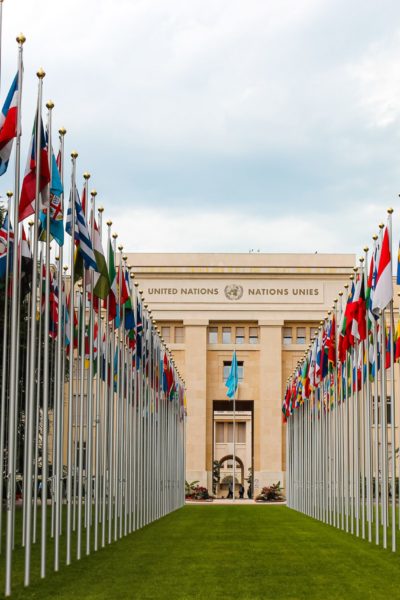
COP28 – what are we looking forward to?
In the run up to COP28, Senior Sustainability Consultant Jonathon Oon outlines highlights from the IPCC Global Stocktake Report and gives an overview of the key themes and focuses of COP28.
Highlights from the IPCC Global Stocktake Report
The global stocktake reviews everything related to where the world stands on climate action and support, identifies the gaps, and seeks to chart a better course forward to accelerate climate action.
They take place every five years, and the first global stocktake technical report was published in September. It was a stark reminder of the urgency of our situation and a call to action. In the lead up to COP28, we created a brief summary of the key points of these reports and discussions:
Mitigation
The stocktake delivers a sobering message: global emissions aren’t aligning with Paris Agreement targets. To bridge this gap, Parties must aim high, striving for global GHG emissions to peak between 2020 and 2025. This calls for more ambitious NDCs (Nationally Determined Contributions) and swift action on domestic mitigation strategies for substantial global emission reductions.
The report highlights the urgency of systemic changes across different sectors, including:
- Phasing out fossil fuels and saying no to new coal projects
- Scaling up renewable energy while phasing out all unabated fossil fuels, with a goal of tripling renewable energy capacity
- Moving towards electrified, energy-efficient systems with upgraded energy storage capabilities, calling for a doubling of the energy efficiency of current assets
- Enhancing agricultural practices to cut emissions, halt deforestation, prevent further land expansion, and restore natural ecosystems
- Tackling emissions from transportation and buildings, including their supply chains
- Implementing circular economy principles
- Calling for developed country Parties to lead the charge in emissions reduction and reach net-zero goals earlier, while providing differentiated pathways for developing country Parties

Adaptation, including loss and damage and finance flows
Urgent action is imperative to enhance adaptation measures, reduce and address loss and damage, especially for vulnerable communities. While ambition in adaptation plans is growing, it remains fragmented and unevenly distributed.
Amplifying support for adaptation and streamlining funding arrangements is critical. There is a clear need to align financial flows with climate-resilient development and to simplify access to climate finance in developing countries. Here, there is enormous potential for multilateral development banks and international financial institutions to step up. In developing nations, international public finance is the linchpin of climate action. It’s crucial to improve access to climate finance in these regions. Both public and private financial flows must align with low greenhouse gas (GHG) emissions and climate-resilient development.
Summary
The first Global Stocktake (GST) lays the foundation for heightened ambition and action in the fight against the climate crisis. But we urgently need more comprehensive efforts involving all stakeholders to achieve the long-term goals of the Paris Agreement. While there’s a broad global commitment to the agreement as a driving force, further action is essential to meet its long-term targets.
The participation and accountability of all stakeholders is crucial for enhancing climate action and support. System transformations does offer opportunities. However, achieving net-zero emissions by the mid-century demands significant changes, with a focus on inclusivity and equity.
The GST reinforces the need to peak emissions by 2025, reduce GHG emissions by 43% by 2030, and 60% by 2035 compared to 2019 levels.

Key themes and focuses for COP28
So, what can we expect from COP28? After the results of the first Global Stocktake, the world is waiting to see real progress, and there’s a growing demand for tangible results and outcomes from COP28.
We’ve outlined 4 key goals of COP28, and how they might impact businesses:
-
Fossil fuel phaseout
COP28 is expected to see work towards a phase-out agreement. However, we expect this to be a controversial issue with some advocating for a ‘phase-down’ rather than a ‘phase-out’. Regardless, the need to accelerate the move away from fossil-fuel reliance is clear and will have a significant impact on businesses dependent on oil, gas and coal.
-
Renewable energy
Accompanying this is a call for clear renewable energy targets, and associated policies to enable the global transition to net zero. Companies who prioritise the use of renewable energy, and those who work directly within the sector, are likely to benefit from an increased demand for wind and solar technologies.
-
Food security and sustainable farming
The COP28 Presidency has invited COP Parties to sign the summit’s Declaration on Resilient Food Systems, Sustainable Agriculture, and Climate Action. With a focus on regenerative farming practices, this will likely encourage business across the Food and Beverage supply chain to develop resilience against climate change.
-
Governmental commitments
COP28 will see commitments to double energy efficiency, triple renewable energy capacity to 11,000GW globally, and double hydrogen production to 180m tonnes a year by 2030. It’s expected that these will have an impact on businesses across the construction and energy sectors.
The upcoming conference is expected to have significant implications for the business world, with the private sector playing a leading role. More than 100 senior executives from the Alliance of CEO Climate Leaders have signed an open letter urging leaders from both the public and private sectors to accelerate their net-zero actions ahead of COP28. According to a survey by Impact and Influence, business leaders across the majority of markets highlighted “private sector engagement” as the key theme for COP28 that is most relevant to their business. The private sector holds the potential to drive outcomes in this conference.
Amid the backdrop of COP27’s disappointments, the upcoming conference signifies a pivotal moment in the climate change fight for businesses, governments, and citizens worldwide. Our collective hope hinges on concrete indicators, meaningful agreements, and decisive actions.

